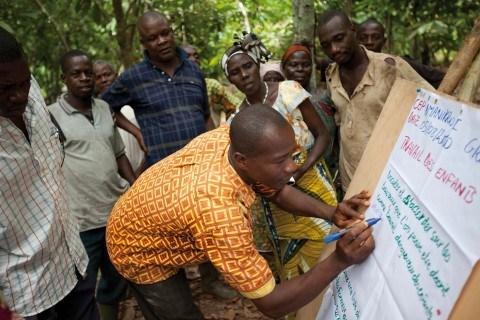
Earlier this month, Hershey announced the expansion of its cocoa farmer training and community initiatives in the Ivory Coast. The company will partner with Cargill to expand the initiative, called 'Learn to Grow Ivory Coast,' to include seven farmer cooperatives and investments in education and teacher housing. Through the initiatives, 10,000 cocoa farmers will be trained in agricultural and social practices that are certified with the UTZ Certified standard. The farmers will receive higher premiums for the cocoa as a result.
The Learn to Grow Ivory Coast program will accelerate Hershey’s purchase of sustainably-sourced cocoa. Hershey has committed to sourcing 100 percent certified cocoa for all of its products globally by 2020. It is committed to sourcing cocoa certified through UTZ, Fairtrade USA and Rainforest Alliance, three of the most recognized cocoa certification programs.
In 2013, Hershey sourced 18 percent of its cocoa from certified sources. By 2016, the company hopes to increase that percentage to between 40 and 50 percent.
The Learn to Grow Ivory Coast program is part of Hershey’s 21st Century Cocoa Sustainability Strategy, and through its various initiatives Hershey plans to reach over 50,000 cocoa farmers by 2017. Other initiatives include the Cocoa Livelihoods Program, which is a project to double incomes of 200,000 cocoa farmers in West Africa. Over 130,000 cocoa farmers were trained through the program in the first five years.
Cargill already has an established network of farm associations in Ivory Coast where the company sources and processes cocoa. For over a decade Cargill has been participating in cocoa sustainability initiatives. Hershey and Cargill worked in the past on CocoaLink, a program that uses mobile technology to provide Ghanaian cocoa farmers with information about good agricultural practices, labor safety and crop marketing. Cargill will focus on three areas for Learn to Grow Ivory Coast which include good agricultural practices, farmer cooperatives infrastructure and education support.
“Hershey and Cargill combine shared values about community responsibility with an urgent focus on bringing better farming practices and market opportunities to Ivory Coast cocoa farmers,” Terry O’Day, chief supply chain officer and senior vice president for Hershey, said in a statement.
Over a third of the world’s cocoa supply comes from the Ivory Coast. The Ivory Coast cocoa sector is plagued with child labor. A report by Tulane University on the cocoa sector in the Ivory Coast and Ghana found that 25 to 50 percent of the children in households in both countries work on cocoa farms. Children working on cocoa farms are “frequently involved in hazardous work.” Children in the Ivory Coast are “engaged in the worst forms of child labor, many of them in hazardous work in agriculture, particularly in the production of cocoa," stated a 2012 report by the U.S. Department of Labor. There are over 109,000 children working in the Ivory Coast’s cocoa industry under the “worst forms of child labor,” according to the U.S. Department of State, and about 10,000 of those children are human traffickinug or slave labor victims.
Image credit: Hershey

Gina-Marie is a freelance writer and journalist armed with a degree in journalism, and a passion for social justice, including the environment and sustainability. She writes for various websites, and has made the 75+ Environmentalists to Follow list by Mashable.com.














